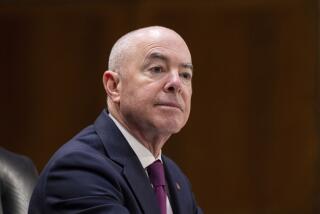Foreign Policy at Risk, Panel Republicans Say
WASHINGTON â Despite the vows of House and Senate select committee leaders not to inject politics into their hearings on the Iran- contra affair, committee Republicans made it clear Tuesday that they believe the fate of their partyâs conservative foreign policy agenda is at stake.
âYou have to be crazy to think that politics can be separated from these hearings,â said one House panel Republican, who asked not to be identified.
What congressional Republicans hope to do is to influence the direction of the hearings in such a way that what they see as the merits of Reaganâs policies--especially in Central America--are separated in the publicâs mind from the disastrous manner in which they were carried out.
Thus, the opening of joint House-Senate hearings Tuesday had a decidedly partisan tone, as some Republicans launched a spirited defense of President Reaganâs foreign policy goals and asserted that his congressional opponents should share the blame for his blunders.
Effort to Shift Blame
âOne important question to be asked is to what extent did the lack of a clear-cut policy by the Congress contribute to the events we will be exploring in the weeks ahead,â said Rep. Dick Cheney (R-Wyo.), the ranking Republican member of the House panel, in an effort to shift some of the blame from the White House.
At the same time, it was clear that some Republicans are determined to maintain a measure of distance between themselves and the scandal. For example, conservative Rep. Jim Courter (R-N.J.)--one of Capitol Hillâs most enthusiastic backers of Administration policies--criticized Reaganâs handling of the Iran-contra affair with a vigor unmatched by any of the Democrats on the committees.
âThe Reagan Administrationâs whole foreign policy approach is marked by a kind of camouflage, by a refusal to take America into its confidence, to say what must be done and then simply to do it,â he said.
Bid to Shield Policy
Even as he lashed the White House on tactics, however, Courter also sought to shield the Administrationâs foreign policy positions against an anticipated Democratic onslaught.
Many fear that the political damage Reagan sustains from the Iran-contra affair will give Democrats the political courage to permanently end support for the Nicaraguan rebels. It could also help them score victories in a host of other areas, including arms control and military spending.
Rep. Henry J. Hyde (R-Ill.) went so far as to characterize the statements made at the opening of the hearings as âa bipartisan funeral march for the Administration.â
One committee Republican said GOP members are âof necessity going to be defensiveâ against Democratic ârabbit-punching and overreachingâ that could expand the investigation into a critical probe of Reaganâs entire foreign policy.
Pledge Not to Be Partisan
Thus far, however, both sides agree that the two committeesâ operations have been remarkably free of partisanship, and Democratic leaders of both committees pledged to keep it that way.
âOur concern in this inquiry is not with the merits of any particular policy, but with flawed policy-making processes,â Sen. Daniel K. Inouye (D-Hawaii), chairman of the Senate committee, said as he opened what are expected to be three months of hearings. âOur hearings are neither pro-contra nor anti-contra; neither pro-Administration nor anti-Administration. . . . We meet here as American citizens united in a common effort to find the facts lest we repeat the mistakes.â
Some Republicans agreed. Unless the hearings proceed in that fashion, âthere are major partisan overtones that could very easily submerge the committee,â said Sen. James A. McClure (R-Ida.).
More to Read
Get the L.A. Times Politics newsletter
Deeply reported insights into legislation, politics and policy from Sacramento, Washington and beyond. In your inbox three times per week.
You may occasionally receive promotional content from the Los Angeles Times.










